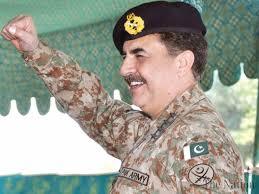Pakistani Generals Will Defend the Constitution
Discarding the historical logic of military coups, the Pakistan Army will this time defend the Constitution and not allow the protest leaders to force resignation of the Prime Minister and dissolution of the National Parliament and Provincial Assemblies.
By letting political forces sort themselves out, the Pakistan Army will emerge as one of the most trusted state institutions, no less revered than the independent judiciary and free press. General Raheel Sharif can restore the dignity of the armed forces that Pervez Musharraf squandered away by pursuing personal glory.
It is no secret that the Generals are most respected when they are not running the country. A civilian government fears the armed forces and respects, though with a tinge of resentment, the Generals' geopolitical views, defense plans, and foreign policy preferences. The Generals have more clout behind the veil of a civilian government.
This is not the time for a military takeover. The Pakistani Generals have no interest in running the federal and provincial governments, given the enormous economic, sectarian, ethnic, and political problems that the nation faces. While fighting the Pakistani Taliban and facing a post-invasion Afghanistan, the Generals do not wish to antagonize a sizable portion of the public, including the press, that opposes military governments.
By staging a military takeover, the Generals will face discomforting uncertainty. The United States and the European Union will likely impose military sanctions. The Generals will be under pressure to tow the U.S. line in Afghanistan as was General Musharraf. The case for the denuclearization of Pakistan, a case in the making, will gather a bit more strength.
Even domestically, the Generals will reap no significant benefit by dismantling the Constitution. They will face a vibrant press and a powerful judiciary. The Generals cannot backwind the freedom of press or judicial independence. Repression is no longer available.
Nor can the Generals count on the protest leaders, Imran Khan and Tahir ul Qadri, for political cover though each has a sizeable following among the people. Surely, the grievances of protest leaders are legitimate. The system needs to be fixed to accommodate their genuine demands that would eventually benefit the nation. Yet, the protest leaders provide little effective sponsorship for the armed forces.
Unfortunately, Imran Khan, a popular icon, comes across as a Quixote fighting non-existent windmills. He lacks the intellectual and temperamental stability to lead a nuclear Muslim nation located in a tough neighborhood. His antagonism to the United States and questionable support for the Taliban muddles his candidacy for the prime job.
Tahir ul Qadri, a religious leader loved by his devotees, is a divisive figure. He cannot unite the nation since many religious groups strongly oppose his views about Islam. To make matters worse, he is surrounded by discarded politicians of the past.
Even if protest leaders invite the Generals to unseat the government, most political parties are united against the imposition of martial law or overthrowing the present government. Any military undermining of the Constitution will unleash forces that the Generals will be unable to contain. It is better for the system to work its way through the difficulty.
The armed forces will be the true winners if the Generals let the politicians sort out the mess. There is no credible evidence that the Generals are planning to shake the boat.
Follow Liaquat Ali Khan on Twitter: www.twitter.com/abukashif


